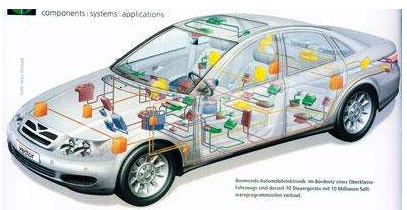For industrial research or observers, the supply chain is a good framework for understanding industrial structure or ecology. However, as technology continues to evolve, this framework is likely to no longer come in handy in the future. Taking the automobile industry as an example, the traditional layered structure is disintegrating. In addition to new members such as cloud service providers entering the automotive industry, car manufacturers, TIer1 (application systems), and TIer2 (modules) have long existed in the automotive industry. The division of labor mode is also changing rapidly.
According to Ian Riches, director of global automotive industry research at Strategy AnalyTIcs, the traditional layered structure of the automotive industry is disintegrating. On the one hand, the role of cloud/service providers in the automotive industry is getting more and more weight. On the other hand, it is more and more common for car manufacturers to skip TIer1 and directly cooperate with modules and even chip factories. He predicted that the ecological structure of the automobile industry in the future will no longer be chain-type, with obvious upstream and downstream differences, but a mesh (Mesh), that is, each member of the industry will directly interact with other members. Related companies must find their new seat in this network.

Riches pointed out that as long as you take a look at CES 2018, it is not difficult to find that service providers will play a more weight role in the automotive industry. For example, Amazon's logo appears in almost every car-related big booth, because smart cars must be connected to the cloud data center to achieve more diversified services and applications; As technology continues to advance, the use of self-driving vehicles to provide transportation services is becoming more and more visible, and many automakers have responded to this.
As new concepts and technologies will cause structural downturns in the automotive industry, many automakers have jumped away from their original mode of operation and worked directly with modules, software and even chipmakers to study how to introduce these new technologies into new vehicles. To this end, many Tier 1 players have begun to transform their layouts in order to meet future challenges.
But this structural flipping will not only affect Tier 1, but every member of the industry will suffer. Nowadays, many first-line automakers have begun to have their own semiconductor and software teams, in order to adapt to the new ecological environment after the automobile value chain has been transformed into a value network. Similarly, many automotive Tier1s have only provided hardware and software integration products to customers, but now Tier1 only does hardware design integration, and software is supplied by other manufacturers.
However, Riches also reminded that although the car wisdom revolution is coming, the car is not a consumer product such as mobile phones, and the process of its paradigm shift takes a long time. In 2006, the market share of the iPhone was still zero, but in 2016, a generation of mobile phone owners Nokia (Nokia) was no longer important in the market; in contrast, Tesla released its first electric sports car in 2006. Today, Tesla's market share in the global automotive industry is still less than 1%.
Riches concluded that how to take the pace of development, neither rushing too fast nor falling behind, is a big challenge for every member of the entire automotive industry.
PS Series Pluggable Connectors
Ps Series Pluggable Connectors,Wire Connectors,Screw Terminal Block,Barrier Terminal Block
Jiangmen Krealux Electrical Appliances Co.,Ltd. , https://www.krealux-online.com